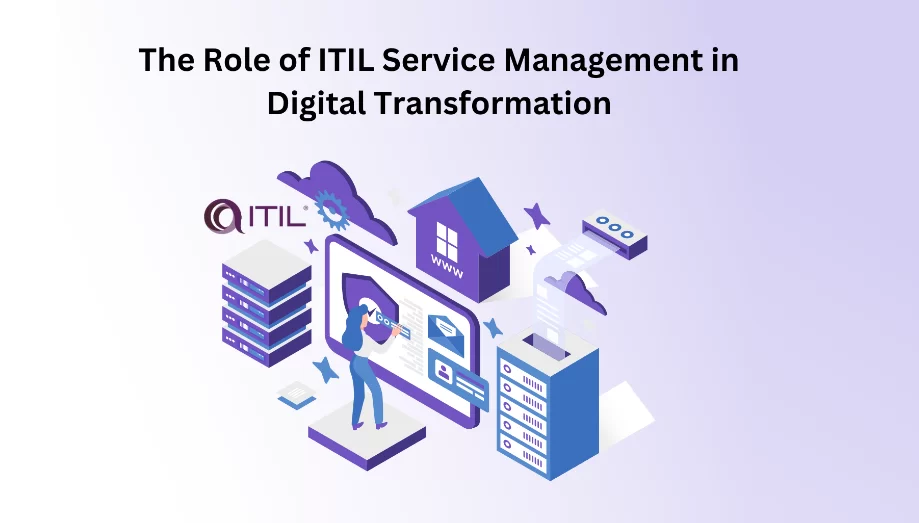The Role of ITIL Service Management in Digital Transformation
Write for us Guest Post: In digital transformation, companies in all sectors use tech to innovate, provide better service to customers, and remain competitive. This change is centred on ITIL Service Management, a collection of recommendations and standards for providing IT services that align with the organisational requirements. When designing, delivering, and continuously improving IT services to meet evolving business requirements, ITIL Service Management is crucial for helping organisations navigate the complexities of digital transformation.
If you are interested in ITIL Course or want to use ITIL Service Management to your advantage, you must know how it drives digital transformation. This blog will examine ITIL Service Management and its relevance to digital transformation.
Table Of Contents
- Emerging Digital Transformation
- Why is ITIL Service Management Relevant?
- Conclusion
Emerging Digital Transformation
To maintain a competitive edge in the digital era, digital transformation has become necessary for organisations in all sectors. This paradigm shifts how businesses optimise their operations, increase revenue, and provide value to customers by incorporating digital technologies into every facet of their operations. When these problems arise, IT Infrastructure Library (ITIL) Service Management is there to help with a well-organised framework and best practices.
Why is ITIL Service Management Relevant?
Aligning IT Services with Business Goals
ITIL Service Management stresses the importance of aligning IT services with business goals and objectives to ensure that technology investments support the organisation’s overall strategy. This alignment is crucial to drive innovation, improve operational efficiency, and deliver value to customers in the context of digital transformation. By implementing ITIL Service Management practices, organisations can guarantee that their IT services are tailored to the business’s requirements, allowing them to take advantage of new opportunities and overcome changing challenges.
Enhancing Service Quality and Reliability
Keeping customers happy and staying ahead of the competition are two of the most important goals of every organisation. From initial concept to ongoing operation and enhancement, IT services can be better managed with the help of IT Infrastructure Library (ITIL) Service Management. Organisations can improve the availability, performance, and reliability of their IT services by applying ITIL Service Management practices. This will help them meet or exceed customer expectations and contribute to the success of their business. This becomes even more important when considering digital transformation, in which companies depend substantially on technology to provide consumers with goods, services, and experiences.
Driving Continual Improvement
Improving IT Services and Processes Ongoing optimisation and refinement of IT services and processes is crucial, as it is emphasised by a fundamental principle of ITIL Service Management: continuous improvement. This principle is vital for organisations undergoing digital transformation, allowing them to adjust to shifting market dynamics, new technology, and customer preferences. Organisations can use ITIL Service Management to discover improvement opportunities, execute fixes, and drive innovation throughout the IT service lifecycle if they adopt a continuous improvement mindset. To succeed in the digital age over the long haul, businesses need to be nimble and quick to respond, precisely what this iterative approach gives them.
Enabling Agile and DevOps Practices
The digital age has seen a meteoric rise in adopting agile and devops methodologies, allowing businesses to improve the speed, flexibility, and efficiency with which they deliver software and services to customers. By outlining best practices for incorporating Agile and DevOps concepts into IT service operations and delivery, ITIL Service Management is a valuable supplement to these methods. Organisations can better align Agile and DevOps initiatives with broader business objectives and ensure controlled and predictable value delivery by adopting ITIL Service Management practices like service design, transition, and operation. When it comes to driving digital transformation initiatives—where innovation, collaboration, and speed are of the utmost importance—this alignment is crucial.
Facilitating Cloud Adoption and Hybrid IT
With its scalability, agility, and cost-efficiency, cloud computing has become an essential tool for digital transformation. The governance, security, and performance issues of managing hybrid IT infrastructures and cloud environments are not underestimated. To help businesses take advantage of cloud computing while minimising risks and making the most of their resources, IT Infrastructure Library (ITIL) Service Management offers a framework for managing cloud services and hybrid IT environments. Organisations can speed up their digital transformation journey by utilising ITIL Service Management practices like service strategy, service design, and service transition. These practices help with cloud adoption and hybrid IT.
Conclusion
Finally, ITIL Service Management is a critical driver of digital transformation by enabling Agile and DevOps practices, improving service quality and reliability, driving digital transformation, facilitating cloud adoption and hybrid IT, and aligning IT services with business goals. To succeed in the digital age, you must embrace the principles and practices of IT Infrastructure Library (ITIL), whether pursuing ITIL Certification or wanting to use ITIL Service Management to drive digital transformation in your organisation. If your company wants to be successful and competitive in today’s digital landscape, it must embrace ITIL Service Management and incorporate it into its culture, processes, and technology.

